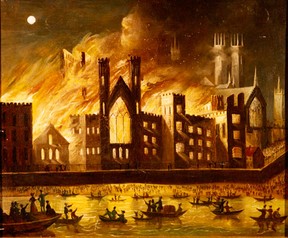 I think that we can assume that the initial hours would have been spent in shock and damage limitation.The heart of Westminster would have been strewn with dead bodies and, presumably, friends and relatives desperately searching for confirmation that their loved ones were amongst them.
I think that we can assume that the initial hours would have been spent in shock and damage limitation.The heart of Westminster would have been strewn with dead bodies and, presumably, friends and relatives desperately searching for confirmation that their loved ones were amongst them.
But radiating out from Westminster Palace, many people would be injured and/or trapped. Flying debris and glass would ensure it. They would all need tending or removing to safety.
Meanwhile, an inferno was still raging and that would have to be dealt with too. With no organized fire brigades, this would need to be a co-operative venture amongst volunteers. Luckily, Westminster Palace is right next to the River Thames, so there would be no shortage of water.
In 1666, a human chain of people snaked from the river bank to wherever the fires had spread. They passed buckets and bowls of water up towards the flames. There's no reason why this scene wouldn't have happened in 1605 too. Unfortunately buckets of water aren't too effective when whole buildings are ablaze.
A frenzied hive of activity would be playing out down wind of the flames. Westminster was a center of trade and industry, so warehouses would be endangered, as well as family homes. All that could be saved would be loaded onto carts and hurried away.
Naturally that would lead to the narrow streets becoming blocked and travel times prolonged accordingly. Tempers would be frayed. Isolated violence would break out in back-streets.
The more canny planners would attempt to create a fire break, pulling down buildings in the direct path of the fire, in order to save those further ahead.
However, all of this would be leading to a huge problem. It was November and therefore winter. The days and nights would be very cold in England, hence not great for suddenly finding yourself homeless. In 1666, Londoners camped upon the slopes of Primrose Hill. This would not be an option in 1605, unless they all wanted to freeze to death.
The first major problem after the injuries and fire would be shelter. Those who could afford it would leave for homes outside London - their own residences or staying with friends. Hotels and inns for miles around would enjoy a profiteering boom. The ugly side of human nature possibly might see prices rising steeply for over-crowded rooms.
My guess is that the majority of people would cross the River Thames. Remember that this isn't an ordinary fire. Westminster Palace has just been exploded and no-one would yet know why, or what was going to happen next. But north of the river would seem much more dangerous than south of it.
The heroes of the hour might well be in Southwark. This was an area filled with theaters, brothels and other houses of ill repute. Shakespeare's Globe Theatre was just down the road, and he would be an eye-witness. Serious civic brownie points and possible goodwill in the future might come from opening up rooms and providing beds there.
Churches would also be great centers for asylum, which would be perfect for all concerned in the circumstances. It would place the displaced in a position where they could hear news; and calm those who thought that this actually was the end of the world.
However, there were no fireplaces nor other sources of heating in those large stone buildings. Those huddled in the pews would be shivering come night-fall.
Eventually it can be expected that official refuges would be provided, perhaps White Hall Palace, if it had survived the fire. Law, order and governance in the capital city could not be done while everyone was displaced, desperate and panicking. White Hall Palace (today's Whitehall) was used as a refuge for commoners during the Great Fire of London a generation later.
It would all be done in the name of the King, though whether James or his four year old son Charles, would depend upon if it was announced that the former was dead.


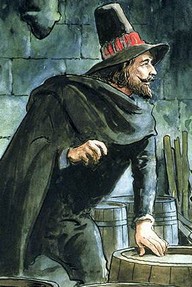 Just after midnight, in the early hours of November 5th 1605, Guido Faukes was arrested in Westminster.
Just after midnight, in the early hours of November 5th 1605, Guido Faukes was arrested in Westminster. 

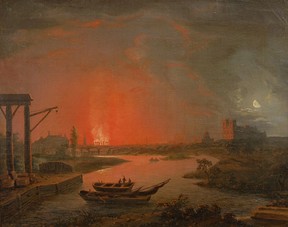 No-one in Parliament House that day would have survived the explosion.
No-one in Parliament House that day would have survived the explosion.


 I think that we can assume that the initial hours would have been spent in shock and damage limitation.The heart of Westminster would have been strewn with dead bodies and, presumably, friends and relatives desperately searching for confirmation that their loved ones were amongst them.
I think that we can assume that the initial hours would have been spent in shock and damage limitation.The heart of Westminster would have been strewn with dead bodies and, presumably, friends and relatives desperately searching for confirmation that their loved ones were amongst them.



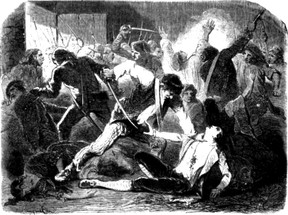 By looking at how people reacted when news spread about the foiled Gunpowder Plot, then adding in what their grandchildren did during the Great Fire, we can make some deductions.
By looking at how people reacted when news spread about the foiled Gunpowder Plot, then adding in what their grandchildren did during the Great Fire, we can make some deductions.




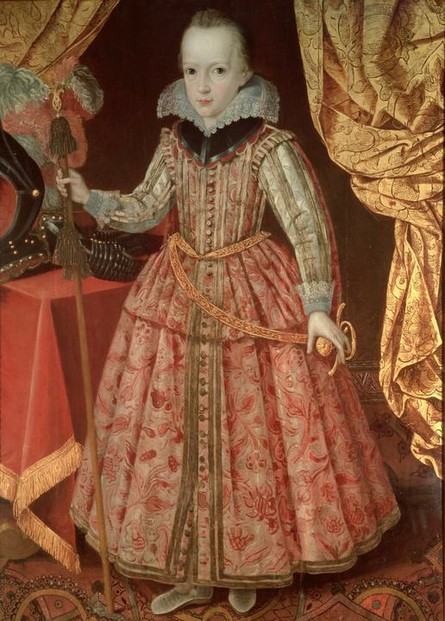
 In 1605, the king was the ruler. Not just a figurehead of state to be gawped at by tourists, but someone who actually called the shots.
In 1605, the king was the ruler. Not just a figurehead of state to be gawped at by tourists, but someone who actually called the shots.


 One of the first things that I can envisage occurring, amongst the English ruling classes, would be a rush to grab and secure Prince Charles.
One of the first things that I can envisage occurring, amongst the English ruling classes, would be a rush to grab and secure Prince Charles.







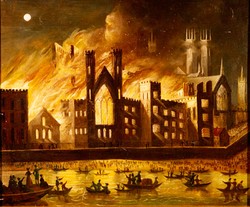

 St Tydecho's Churches in West Waleson 09/03/2014
St Tydecho's Churches in West Waleson 09/03/2014
 Goodies for an Outlander Premiere Partyon 03/06/2015
Goodies for an Outlander Premiere Partyon 03/06/2015
 Holocaust Memorial Day Interview with Rainer Höss, Grandson of Rudolf Architect of Auschwitzon 01/24/2015
Holocaust Memorial Day Interview with Rainer Höss, Grandson of Rudolf Architect of Auschwitzon 01/24/2015
 Romantic Valentine Gifts for an Outlander Fanon 01/16/2015
Romantic Valentine Gifts for an Outlander Fanon 01/16/2015

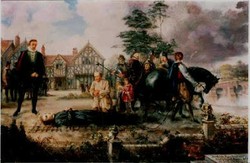
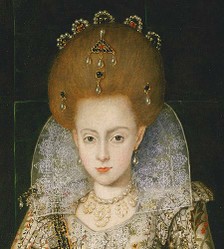
Comments
Ideally, he would have been, because she was very good for him. But I doubt it. Whoever had control of him would want to raise him too. Leaving him with Lady Carey would be tantamount to giving control of the realm to the Earl of Monmouth.
In this case, it wouldn't be Lord Robert - who had upset the English aristocracy in 1603 anyway - but his teenage son. Why promote another family, when you can promote your own?
I found this article a very interesting read. Couldn't Charles just have been left with Lady Carey?
I don't know about the Physics (or Metaphysical) perspective, but from an historical one, I just had to draw a line. The repercussions would be going on and on and on. I only really described one day up there, with a summary on the more immediate big points from the next few decades. So much would ripple out from that one single changed moment.
It's hard to say with something like how Bacon's mind worked. If it was a formula or a mathematical equation, then eventually someone would get there. But if it was gone big idea that could only occur to someone who'd experienced precisely what Bacon had experienced, then it would be lost forever.
I can give you an example here too. If Parliament House had blown, then would Princess Elizabeth still have married Frederick of Bohemia? There might have not been the same political imperative, or there may have been a different one. If they didn't marry, then Elizabeth of Bohemia (their daughter) wouldn't have been born.
It was her mind and correspondence which led Descartes into his most famous philosophy.
I've heard tell of that film, but I don't know what it is. If you find out, will you please let me know? It sounds fascinating!
I enjoyed this! I wonder what the grander repercussions of this might have been had they succeeded? I mean we can never know, the whole butterfly effect thing. I dunno, this is Liam's realm, but I love the idea that on a quantum level nothing is determinate (I suppose there are philosophies regarding the physical world as to whether things are determinate or indeterminate, but I think more recent physicists argue that it is indeterminate, an idea that drove persons like Schrodinger crazy) and so there's idea that even changing an air current a million years ago could change the entire history of everything.
But like with loosing Francis Bacon, would the loss of his scientific mind significantly affected the course of science's history? Or would someone spend time working out his works, instead of their own significant contribution, leading to a ripple effect of putting us behind a few years, and then a few decades...I dunno, maybe I'm being dramatic.
I was just being told about this bizarre movie about how we're living the best possible history. And like a bunch of really famous people in history, I think Hitler being one of them, were actually just people who were from the future who kept traveling back and quirking with things to improve the overall whole historical timeline- the movie played with the idea that death and wars and tragedies are imminent but that there are so many possible histories that are way worse than the one we are living. Oh, and all of these future people lived together on the dark side of the moon. :|